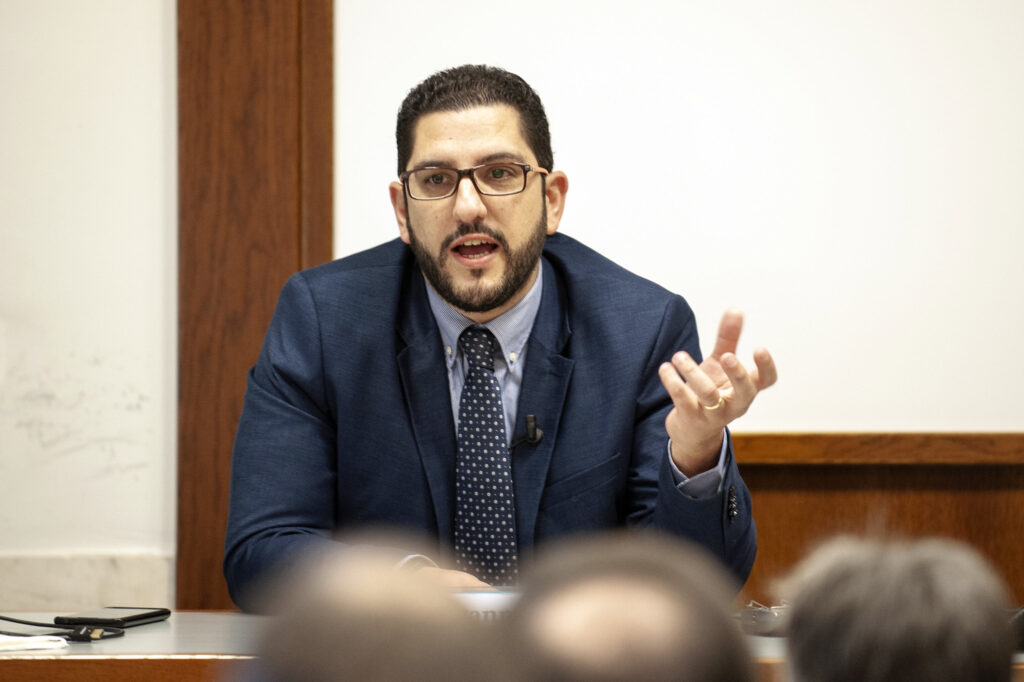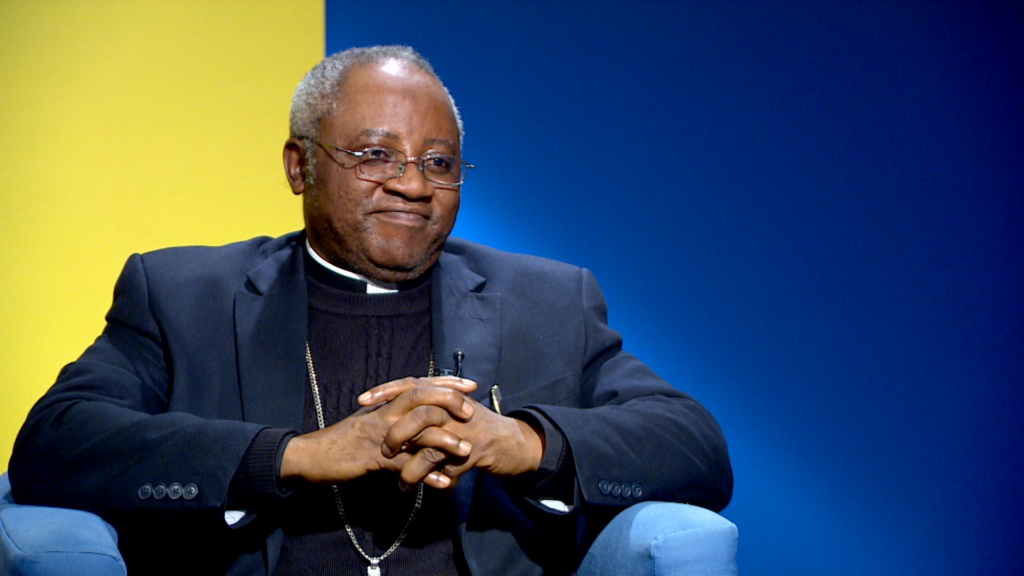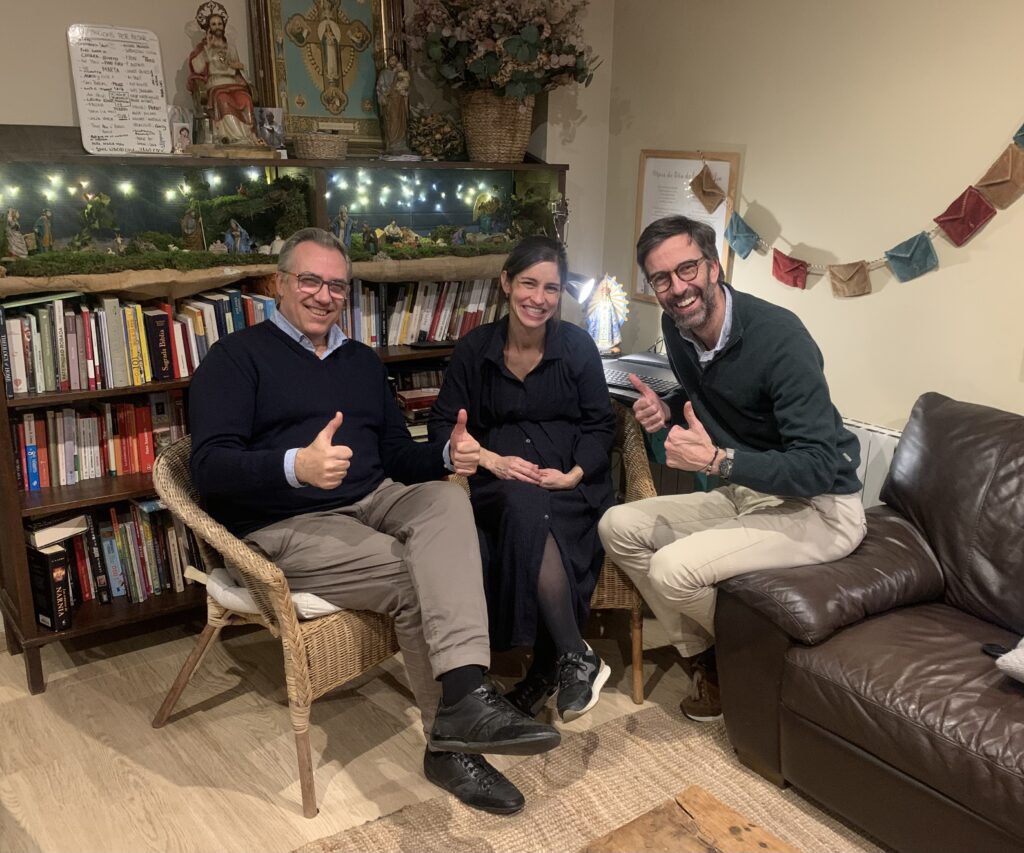Church and Artificial Intelligence, a positive relationship with attention to risks
Giovanni Tridente: «Effective tool, but an ethical sense is necessary»

Artificial Intelligence presents us with sophisticated, fast and effective tools: it is necessary to know them well to know how to use them ethically. Consequently, we must overcome the suggestion that the word “intelligence” can provoke and look at it for what it is, a powerful technology that creates new content, most of the time surprising. It is important to remember that these programs lack any intentionality and critical thinking. This is why human presence will always be essential for its use.
These are some of the essential ideas that emerge from the interview with the Director of Communication of the Pontifical University of the Holy Cross in Rome, Giovanni Tridente, author of the book Anima Digital. La Chiesa alla prova dell’intelligenza Artificiale (Tau, 2022).
During the colloquium he highlights how the Catholic Church, “as a mother and teacher”, maintains a positive attitude towards this technology without forgetting, obviously, the possible worrying and dangerous implications for human beings. He reminds us how the Church’s initiatives in this field reaffirm the need to build a future in which technological and digital innovations are always at the service of human creativity, “without causing gradual substitution.”
Professor Tridente, advances in Artificial Intelligence (AI) are topics of constant conversation today, although many do not fully understand their meaning. Could you explain simply what AI is?
«In fact, for approximately a year and a half, with the global availability of ChatGPT – a conversational system based on machine learning – artificial intelligence has flooded all types of conversations, sometimes even excessively. This situation has generated, on the one hand, reactions of concern and, on the other hand, excessive enthusiasm, both probably the result of an erroneous or non-existent understanding of what we really have in our hands.
Could you explain in a simple way what AI is?
«Without dwelling too much on the historical context in which this field of study and research emerged – whose origins date back to the 1950s, including the coining of the term -, we can briefly say that Artificial Intelligence brings together a set of systems based on a vast range of methodologies and techniques related to the fields of computing capable of imitating human intelligence. This occurs through algorithms and software that allow machines to perform activities that were previously exclusive to humans, such as understanding language, recognizing images and sounds, solving complex problems, automatic translations, autonomous driving, etc.
Thinking about AI available to everyone today, how does this happen in practice?
«AI encompasses a series of approaches and techniques related to machine learning, which simulate the functioning of human neural networks. These systems, supported by a large number of calculations and a huge set of computer data, surpass various human abilities in speed and efficiency, especially the most representative ones. It is important to remember that AI is not magical or infallible technology. It is a powerful tool with great potential to improve our lives, but it also presents risks and challenges that must be carefully considered. The true AI revolution lies not in the mere imitation of human intelligence, but in the creation of intelligent systems that can collaborate with us effectively, complementing our capabilities and working together to build a better future.
The public imagination of AI is characterized, therefore, by the presence of humanoid robots, voice assistants, algorithms and machine learning tools that today can help us read texts, generate personalized responses or translate videos and podcasts. A vision that focuses on external elements that offer very effective services and tools. However, how can we use AI creatively to improve our lives?
«I answer based on exactly some key words that you use in the question. Without a doubt, we are faced with sophisticated and effective tools that aim to offer us a service. In this sense, it is important to consider this fundamental characteristic so as not to fall into the error of considering these machines as infallible “oracles” to which we can delegate any function or knowledge, without, on the contrary, exercising a balanced and necessary critical spirit that preserves us. of dangerous deviations.
Are there other aspects to consider?
«You also mentioned the term creativity, which I fully embrace in this context of technological evolution that we are experiencing, and which I associate with a previous phase that I call knowledge. If we really want to live as protagonists in this time of accelerated development that we have had to live through and that sooner or later will flood all areas of our existence – as happened in the past with other types of “discoveries -, we inevitably need to know it, understand how it works , go deeper and study its negative but above all positive implications, and see it in a development perspective. Subsequently, exercise a type of creativity that leads us to use these tools to improve our lives, our work, our educational models, relationships, economic progress, overcoming inequalities, etc., leading to innovation and sustainable growth, which are concepts that are always in fashion.
In this phase of great and rapid expansion of generative technologies, what should be the role of humans?
«Man must remain at the center of this technological progress, as they commonly say, preserving his “human capital.” But I would say that he should also be at the beginning, where these tools are thought, developed and tested, so that responsibility and beneficial projection of the artifacts prevails. And he must be at the end, when he is called to personally apply the functions of these technologies, regulate the use, consumption and purpose, so that he can safeguard personal and community safety. All this generating a kind of harmonious coexistence between technology and human talent.
Specifically, what could be, in your opinion, the main lines of action so that humanity, that is, we, can take control of the technology we use?
«Machines by themselves do not and will not give themselves objectives, purposes or rules, which is why human presence is essential. As media, these artifacts do not have and will not have their own responsibility, and there will be no tricks to “delegate” decisions that remain fundamentally human to machines.
Can you give any example?
«Unfortunately we noticed this situation in recent war conflicts, where sophisticated tools are used that apparently make “autonomous” decisions. We could unconsciously think that it is the machines’ “fault” if they make mistakes in their objectives (for example, attacking defenseless civilians, going against international conventions, but also against any logic of humanity). However, it was a human being who decided to resort to this type of technology, knowing that it could fail.
Is there also a deeper meaning?
«Without a doubt, this explains why the centrality of the person, of each one of us, will never fail in this context. In fact, every day we will be challenged to give reason for our dignity and the conscience with which we want to be protagonists of our existence; whether orienting ourselves towards good or towards what harms and limits us. Ultimately, we should learn to enhance – certainly with the help of technology – each intrinsically human quality, such as the ability to cause positive changes in our environment, inspire trust and generate emotional connections with our fellow human beings. At the end of the day, we are still “social animals”, as Aristotle, who had understood it twenty-four centuries ago, said.
In his message for the 57th World Day of Peace, celebrated on January 1, 2024 under the title “Artificial Intelligence and Peace,” Pope Francis spoke of the dangers and opportunities related to AI. How does the Church address these effects on the life of the individual? Is there any specific initiative?
«In fact, for several decades the Magisterium has questioned the dangers and opportunities linked to technological advances and, more specifically, to Artificial Intelligence.
Already in 1987, Saint John Paul II, meeting with the citizens of Detroit, United States, had invited them to consider the more complicated effects that would arise from a “robotization” of the world of work. He also asked on several occasions that promoters and businessmen would not forget to contribute a “supplement of the soul” to this revolutionary context, so that man would remain at the center of the process and not become a “victim.”
Have there been other pronouncements?
«For his part, Benedict XVI invited us not to fall into experimental techniques, but to promote on each occasion that which most favors the authentic good of people, seeking a balance between freedom and the ability to understand the consequences of our actions. Pope Francis is the one who has made the most frequent interventions, due to how these technological developments are accelerating at the current time. He also called to safeguard the protagonism of man, to discern the consequences of this development with “moral conscience”, proposing at the same time a universal ethics and regulation.
Are there guidelines on this?
«For a decade, various Vatican organizations, such as the Pontifical Academies, have questioned the developments and consequences of artificial intelligence, reaching the conclusion that these discoveries must be accompanied by a critical sense and a will for good; They did so by publishing a series of statements of intent. The last in chronological order is the Rome Call for AI Ethics, promoted by the Pontifical Academy for Life and initially signed by large technology companies such as Microsoft and IBM. It is noted as a “document of shared commitments” through which to stimulate the sense of responsibility of organizations, governments, institutions and the private sector, for a future in which technological progress and digital innovation are at the service of “genius human” and his creativity, without provoking a gradual substitution.
In conclusion, why is the Church so interested in Artificial Intelligence?
«The Church, therefore, is interested in artificial intelligence because it is interested in man, and as “mother and teacher” – an expression loved by another saint, John XXIII – it does not stop accompanying each of its children on a path of profitable and beneficial life. Alerting him of the dangers and encouraging him to give his best for himself and for others, taking advantage of precisely that intelligence and intrinsic capacity that derives from having been created by an almighty God.
Related

Thy will be done
Albert Cortina
17 April, 2025
35 min

Despite hardships, Christianity is growing “astronomically” in northern Nigeria
Ayuda a la Iglesia Necesitada
10 April, 2025
3 min

“Christianity, a Powerful Engine of Social Transformation”
Exaudi Staff
09 April, 2025
3 min

Let God be God
Albert Cortina
11 March, 2025
25 min
 (EN)
(EN)
 (ES)
(ES)
 (IT)
(IT)

